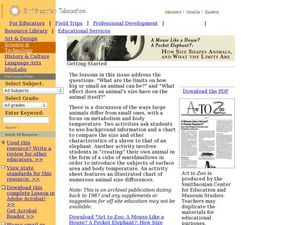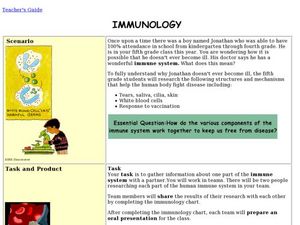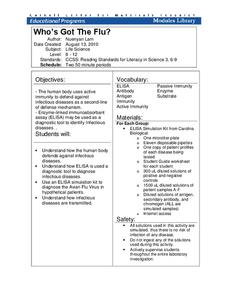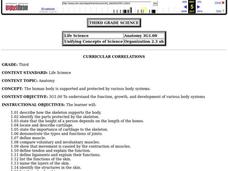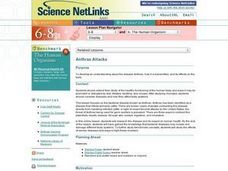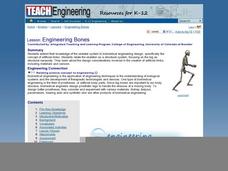Healthy Native Youth
Chapter 5: Learning About HIV/AIDS/STI's and Hepatitis Transmission
Middle schoolers delve deep into facts about HIV, AIDS, Hepatitis, and other STI's by way of discussion and a hands-on activity. Scholars ask and discuss questions anonymously using a Question Box. Two experiments showcase the...
Curated OER
Where Does the Blood Go?
Students investigate where the blood in our hearts travels by observing a diagram in class. In this cardiovascular lesson, students examine their own heart by checking their pulse in class. Students investigate a human body...
Curated OER
My Five Senses
Students investigate the five senses. In this senses instructional activity, students explore the nervous system. Students examine how the body receives information through the five senses.
Curated OER
Immune System Function
Students study the different facets of the Human immune system, including the functions of all the different organs in the immune system.
Curated OER
TE Activity: Sound Line
Students investigate the decibel readings of various noises. They determine why high-level readings damage hearing. Students arrange sound from the lowest to highest decibel levels when they written on a piece of paper.
Curated OER
Frogs
Students explore the external and internal structures of an amphibian and how frog anatomy compares to human anatomy. They collect pictures of a frog using a digital camera, create a web page, develop a PowerPoint presentation, and...
Curated OER
How Size Shapes Animals
Learners investigate how size affects large and small animals differently. In this animal lesson plan, students determine how size affects different animals by constructing their own animal out of marshmallows. Once learners create...
Curated OER
Immunology
Learners investigate the immune system. In this immune system instructional activity, students explore the immune system through participating in a WebQuest. After completing the WebQuest, learners create a video documentary or chart.
Cornell University
Who’s Got The Flu?
Become an immunologist for the day. Scholars elicit the use of the enzyme-linked immunoabsorbent assay (ELISA) to diagnose an infectious disease. Through the process, they learn about the immune system response to infectious diseases.
Curated OER
Skeletal System
Third graders describe and identify the parts of the skeleton and how they support the body. They observe two chicken bones that have been soaked in vinegar for 5 - 7 days. They observe the bone's appearance after it has been removed...
Curated OER
Body Battles!
Seventh graders explain the role of white blood cells in fighting infections. In this life science instructional activity, 7th graders create flow charts showing the immune response process. They act out and play a game to simulate...
Curated OER
Hand Sensitivity
Students experiment with the sense of touch. In this tactile lesson plan, students determine the most sensitive area of the hand. Students experiment by describing objects through touch only. Students compare the amount of sensory data...
Curated OER
Artificial Heart Technology
Students discover the basics of the human heart and how it functions. They examine the whole circulatory system and how an electric heart would work inside the human body. They can choose to perform their own surgery by following...
Curated OER
MuscleMania
Students learn three different types of muscles. By building a model of the arm, they learn its basic anatomy and how muscles function in relationship to bones. They perform an experiment on the relationship between muscle size and...
Curated OER
How Does Radon Affect Human Lungs?
Middle schoolers identify the different parts of the respiratory system of the human body. They work together to complete an activity and worksheet about the effects of radon on the lungs. They research lung diseases if time permits.
Curated OER
Anthrax Attacks
Middle schoolers develop an understanding about the disease Anthrax, how it is transmitted, and its effects on the body. They use this online lesson to research the disease and its impact on human health. Students gain knowledge that...
Curated OER
Fighting Infection
Pupils study immune responses and the structures that are related to immune cells functions. In this fighting infection lesson plan students construct antibody complexes and model the interaction of the immune system when it is...
Curated OER
Anatomy and Physiology "Quickies"
Students use a variety of creative writing tools within this assignment: poems on particular organ systems, write a short story and/or create a word graph. They are involved in a demonstration of lactic build up in the muscles, a...
Curated OER
Engineering Bones
Pupils identify the features of a prosthetic limb and explain how engineers are involved in the prosthetic design. In this bone engineering lesson students describe the design criteria that goes into choosing the materials that go...
Curated OER
Anthrax Attacks
Learners develop an understanding about the disease Anthrax, how it is transmitted, and its effects on the body. By the end of the activity, students have gained the knowledge that bacterial diseases may invade and damage different body...
Curated OER
Modeling Breathing Action
Students create a model to identify the parts of the human respiratory system. They explore the Functional Electrical Stimulation (FES) and its use as a breathing support strategy. Students explore reflex actions as an involuntary...
Curated OER
Nerve Cell Informercials
Young scholars research the structure and function of the nervous system. They prepare a model or representation of neural transmission. Students create an infomercial about nerve cells.
Curated OER
Mapping the Homunculus
Students determine the relative number of nerve endings located in the skin. By calculating the reciprocal of these measurements, students have the appropriate data for predicting the relative size of the homunculus found on the cerebral...
Curated OER
Diversity And Adaptations Of Organisms
Seventh graders demonstrate the processes of science by posing questions and investigating phenomena through language, methods and instruments of science. They study the body features or systems of several animals.






